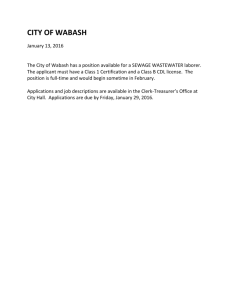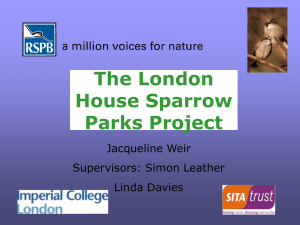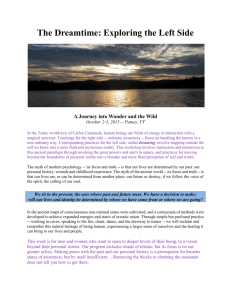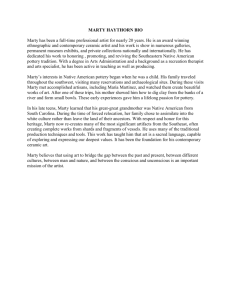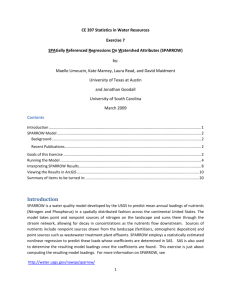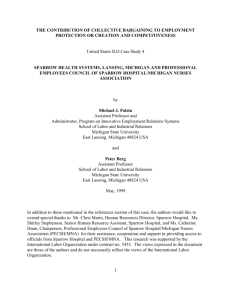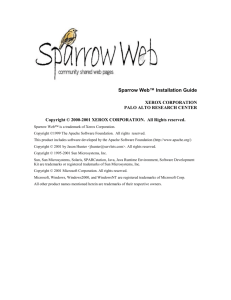Terre Haute`s 51st Christmas Bird Count (2010): 87 species By Peter
advertisement
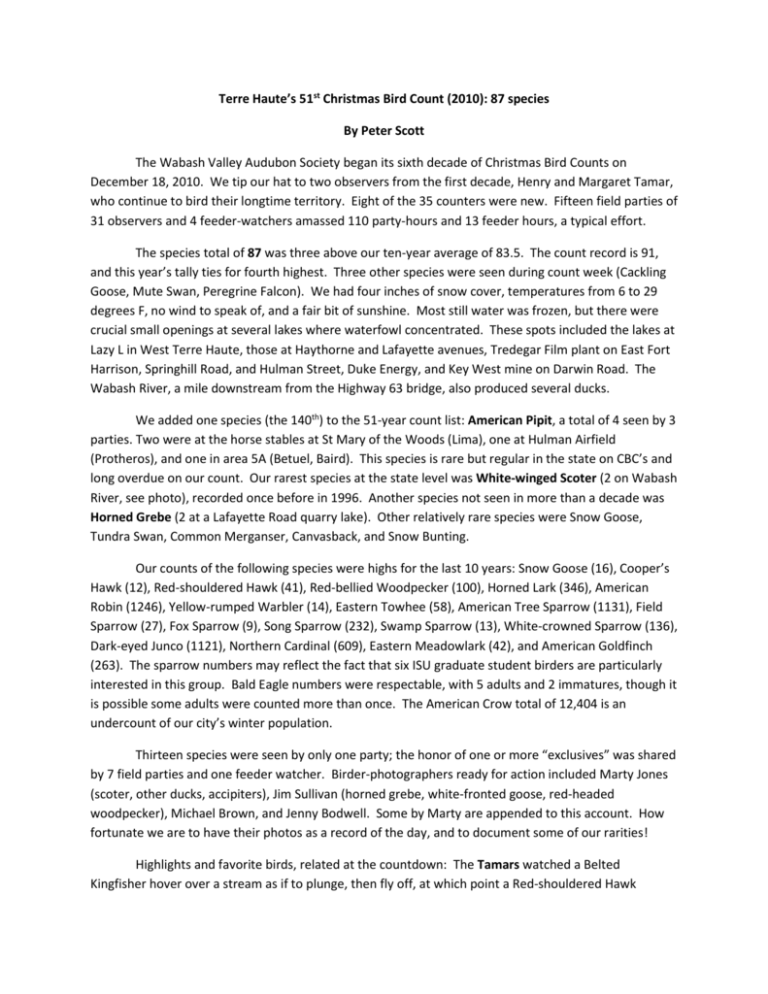
Terre Haute’s 51st Christmas Bird Count (2010): 87 species By Peter Scott The Wabash Valley Audubon Society began its sixth decade of Christmas Bird Counts on December 18, 2010. We tip our hat to two observers from the first decade, Henry and Margaret Tamar, who continue to bird their longtime territory. Eight of the 35 counters were new. Fifteen field parties of 31 observers and 4 feeder-watchers amassed 110 party-hours and 13 feeder hours, a typical effort. The species total of 87 was three above our ten-year average of 83.5. The count record is 91, and this year’s tally ties for fourth highest. Three other species were seen during count week (Cackling Goose, Mute Swan, Peregrine Falcon). We had four inches of snow cover, temperatures from 6 to 29 degrees F, no wind to speak of, and a fair bit of sunshine. Most still water was frozen, but there were crucial small openings at several lakes where waterfowl concentrated. These spots included the lakes at Lazy L in West Terre Haute, those at Haythorne and Lafayette avenues, Tredegar Film plant on East Fort Harrison, Springhill Road, and Hulman Street, Duke Energy, and Key West mine on Darwin Road. The Wabash River, a mile downstream from the Highway 63 bridge, also produced several ducks. We added one species (the 140th) to the 51-year count list: American Pipit, a total of 4 seen by 3 parties. Two were at the horse stables at St Mary of the Woods (Lima), one at Hulman Airfield (Protheros), and one in area 5A (Betuel, Baird). This species is rare but regular in the state on CBC’s and long overdue on our count. Our rarest species at the state level was White-winged Scoter (2 on Wabash River, see photo), recorded once before in 1996. Another species not seen in more than a decade was Horned Grebe (2 at a Lafayette Road quarry lake). Other relatively rare species were Snow Goose, Tundra Swan, Common Merganser, Canvasback, and Snow Bunting. Our counts of the following species were highs for the last 10 years: Snow Goose (16), Cooper’s Hawk (12), Red-shouldered Hawk (41), Red-bellied Woodpecker (100), Horned Lark (346), American Robin (1246), Yellow-rumped Warbler (14), Eastern Towhee (58), American Tree Sparrow (1131), Field Sparrow (27), Fox Sparrow (9), Song Sparrow (232), Swamp Sparrow (13), White-crowned Sparrow (136), Dark-eyed Junco (1121), Northern Cardinal (609), Eastern Meadowlark (42), and American Goldfinch (263). The sparrow numbers may reflect the fact that six ISU graduate student birders are particularly interested in this group. Bald Eagle numbers were respectable, with 5 adults and 2 immatures, though it is possible some adults were counted more than once. The American Crow total of 12,404 is an undercount of our city’s winter population. Thirteen species were seen by only one party; the honor of one or more “exclusives” was shared by 7 field parties and one feeder watcher. Birder-photographers ready for action included Marty Jones (scoter, other ducks, accipiters), Jim Sullivan (horned grebe, white-fronted goose, red-headed woodpecker), Michael Brown, and Jenny Bodwell. Some by Marty are appended to this account. How fortunate we are to have their photos as a record of the day, and to document some of our rarities! Highlights and favorite birds, related at the countdown: The Tamars watched a Belted Kingfisher hover over a stream as if to plunge, then fly off, at which point a Red-shouldered Hawk swooped in and plucked a large bass from the spot which the kingfisher’s flight had indicated. The fish would have been too big for the kingfisher; how resourceful of the hawk, not known as a fish-eater, to take advantage of the kingfisher’s expert eye! Alan Bruner and Marty Jones found a fine group of ducks on the Wabash River below the west bank settlement off Barnhardt Road, downstream from the Highway 63 bridge. Drifting along with a Canvasback, 11 Hooded Mergansers, Mallards, and a Pied-billed Grebe were two White-winged Scoters in a plumage resembling that labeled by Sibley as “juvenile/1st winter”. Marty placed a cell phone call to Peter Scott, who was tromping through the Fourth Street Bottoms made famous by the late Eugene Muench. Peter crawled through snow to hide behind trees along the elevated bank, keeping Mallard alarm calls to a minimum, and was rewarded with a view of all these birds plus a Wood Duck. The Millirens birded the Rosedale area, Forest Park, and Haythorne Road lakes, especially enjoying a Fox Sparrow by the roadside. The Bakkens had a good variety of sparrows at Hawthorn Park. Jane Chestnut, Cathy Frakes, Scott Kidder, and Dave Stanley watched feeders, and Jane’s Purple Finch was our only one of the day. Jenny Bodwell and Jim Sullivan found (and Jim photographed) Horned Grebes at the deeply recessed quarry lake along Lafayette Avenue , which was not frozen at all; this lake was once a grand swimming hole for North-siders, according to Barbara Weber. Adam Betuel’s scouting in area 5A (part of the “graduate student territory”) paid off, as he and Michelle Baird located Northern Pintail and Green-winged Teal at the Springhill Road lake, plus good numbers of Field and Swamp Sparrows. The other graduate student party in area 5B --Jennie Carr, Mike Gerringer, Vanessa Kinney -found 15 Snow Geese and enriched the land bird count. Michael Brown and his under-the-weather companions (Bonness, Eberwein, Weber), birding near the old Pfizer plant, found Snow Bunting, Rubycrowned Kinglet, and half of the Lapland Longspurs. Susie Dewey and Joy and Mike Sacapulos had two Red-breasted Nuthatches, which were scarcer than usual. Jeff Schaffer hiked the Heritage Trail and Rose-Hulman campus and found Goldencrowned Kinglets. Carissa Lovett and Jane Creedon gave us day-long coverage at Dobbs Park. Denise and Andy Prothero found one of the American Pipits at Hulman Airfield, six species of ducks at Hulman Street lake (including Buffleheads), and staged a valiant vigil though in vain for Short-eared Owl at the airport. Joe Dickson and John Haag counted almost 200 American Tree Sparrows at Duke Energy, where all water was frozen except the river. Steve Lima, working between the Wabash River and Darwin Road, had the highest party total (60 species) and got the Tundra Swans, Common Merganser, and Brown Thrasher. As usual in this sort of weather, Canada Geese were on the move everywhere, especially along the Wabash River, almost as dominant a local presence as the American Crows. Honking in flight against a winter sky, they became a wild bird again to a jaded birder. A small hole in the ice at Lazy L Lake held at least 1500 sleeping geese at dawn, which Bodwell, Scott, and Sullivan scanned at close range thanks to the lake owners’ hospitality. At sunset, Bruner and Jones counted 3000 packing into the same small space. Fifteen of us held the countdown at Moggers on Poplar Street, close to the perennial crow roost, and enjoyed Jim Sullivan’s photos. The compilers (Peter Scott, Dan Weber) thank Steve Lima for supervising the lunchtime tally (80 species) and determining species to target for the afternoon. The second 50 years of Terre Haute Christmas Counting has begun! Two White-winged Scoters, right scoter with fish. Photographed during the Terre Haute, Vigo County, Indiana Christmas Bird Count, December 18, 2010 on the Wabash River east of Marion Heights and Barnhardt Road. Found with Alan Bruner. Photo by Marty Jones. Cooper’s Hawk, Hasselburger Road. Photo by Marty Jones.
